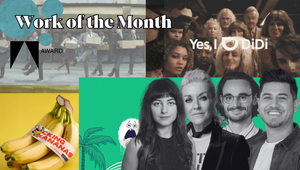
Romantasy Taught This Strategist That Real People Are Into Weird Shit

In the final months of 2023, tragedy befell me. While on a solo cultural excursion to the MCA, I slipped, dislocating and breaking my ankle in three places. Surgeons were astonished by my misfortune—my injury was most common in high-impact car collisions or professional sports accidents.
In between rounds of surgery, I had an excruciating amount of time on my hands. Maddening boredom sent me to strange corners of the internet, Goodreads, and, ultimately, fantasy smut.
What began as a way to pass the time quickly morphed into an obsession. And when I came up for air (in between reading about mythical creatures getting it on in remarkably inventive ways), I couldn't help but wonder what else the nerds had been gatekeeping, so I called on my favourite to find out.
Tim Collier used to be my boss. Now, he is my friend, head of strategy at cummins&partners, and a self-proclaimed super nerd. What starts as a conversation about books quickly descends into a broader discussion on hobbies, failure, and the deterioration of 'the third space'.
"I like how you talk about the effect of fantasy, especially how it resonates with a lot of people going through similar struggles,” he says.
“The social critic Mark Fisher published a book called ‘Capitalist Realism’, arguing that capitalism thrives as the dominant ideology because it presents itself as the only possible way forward. Ursula K. Le Guin said something years earlier about the purpose of fantasy. She believed that writing fantasy allows us to imagine futures we aren't permitted to think about in our current reality. Fantasy, for her, was both a way to warn us about possible futures and to imagine utopias for the future."
Imagine a new reality, indeed. If Aelin Galathynius from 'Throne of Glass' can come out victorious in battles to the death while subsequently liberating an empire, surely I can navigate the sensitive nature of timelines (please give strategists more than two days to deliver a brand strategy) while remaining sufficiently palatable to my colleagues.
As an industry obsessed with optimisation, driven by awards and peer recognition, we exist in a perpetual echo chamber of individuals who think, talk, and feel in much the same way. This confirmation bias is compounded by the fact that work increasingly cannibalises our free time and mental energy, leaving little room to engage in other human stuff.
The breakdown of the space between our home life and our professional one, in combination with a societal fixation with automation and disruptive tech, has resulted in an increasingly homogenised reality, punctuated by meaningless algorithmic slop. It's why hobbies, and niche ones in particular, have transitioned from a nice way to pass the time to, according to cultural analyst Eugene Healey, a “post-luxury status symbol”.
To make impactful work, you need to be an active participant in the new, rogue, and novel. Like eating the same dinner three nights in a row, we're in a repetitive cycle of consumption: absorbing content of the same speak, style, look, and feel.
Tim recognises the challenge of retaining an experimental, daring mentality while constrained by a pressure to guarantee success.
"Advertising, in particular, has a unique creative requirement: it can't fail. You can't afford failure. That's why so many of us develop defence mechanisms, like huge egos—because we're trying to avoid failure. But the truth is that failure is necessary. You just need to fail in private, within a smaller community."
He references his commitment to performing with his band as a way to connect with people in a different environment while carving out an opportunity to experiment and receive feedback.
"With music, you perform a song, and the audience's reaction tells you if it's working. The feedback loop helps you figure out what you're trying to achieve. I can test my creative thinking and fail within a small, controlled space before it connects to a larger group."
Somewhere along the journey from childhood to adulthood, failure becomes the most embarrassing thing that can happen to you. It seems few people pursue things purely for the love of it anymore; everything is measured and valued by achievement, contribution to an image, a personal brand, or an outcome. But as the most influential philosopher of our time, ASAP Rocky, once said, "How are you going to knock somebody for actually trying? Since when has it become not cool to try?"
In many ways, being a grown-up is a punishing experience. It lacks whimsy; it can feel monochromatic and monotonous, a time when you become set in your ways, your outlook on the world, and who you think you are. But we deserve more than that— as does this industry and the everyday people exposed to our work.
In my book, a good day is measured by how many laughs I can coax from co-workers. Isn't that, in essence, our mission? A little giggle from a passerby on their way to adult daycare? Permit yourself to do things ‘off-brand’ - read, watch, and participate in activities not to your taste, talent, or even your liking.
The people you want to connect with aren't necessarily within the four walls of your agency, they're out in the world, and they're into weird sh*t. As Ursula K. Le Guin said, "People who deny the existence of dragons are often eaten by dragons. From within."















